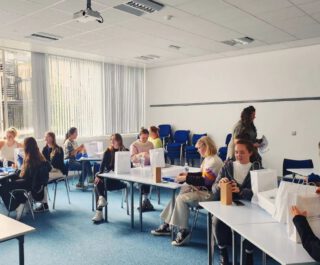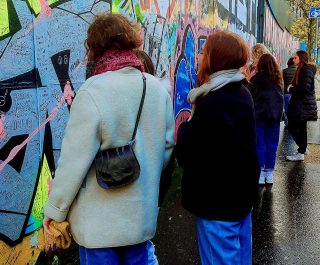You will be provided with opportunities to learn about the history, heritage and culture of Northern Ireland and develop your intercultural skills, as well as growing both personally and professionally.
Study
Stranmillis has developed a number of bespoke modules specifically designed to enrich your international exchange and study abroad experience, providing opportunities to learn about the history, heritage and culture of Ireland and develop your intercultural skills. Following completion of their semester, students will receive a transcript from QUB detailing the modules taken, credits completed and grades achieved. Your home institution will advise on how international credits will be applied to your academic record. Below are some examples of modules available.
RECOMMENDED MODULES
Stranmillis has developed the following modules to enrich your understanding of the history, heritage and culture of Ireland and develop your intercultural skills.
PEACEBUILDING, EDUCATION AND SOCIAL JUSTICE (SEO2003)
This module provides an introduction to this history of Northern Ireland and considers the importance of peacebuilding and reconciliation in a society emerging from a violent political conflict. You will also explore the role of educators as peace builders and consider how teachers can embrace cultural and ethnic diversity in their classrooms to promote social justice.
NORTHERN IRELAND CULTURE AND EDUCATION (SEO2001)
With an emphasis on schools and the curriculum, the module examines the Northern Ireland education system and curriculum, past and present, contrasting it with other systems globally. It also looks at cultural influences and patterns. Current issues and challenges covered include inclusivity in education, educational selection at age 11 and religious and social segregation and integration.
CHILDREN’S LITERATURE (SCS3016)
This module investigates a range of texts written for children, including traditional tales, picture books, fantasy, realistic fiction, historical fiction and poetry. There will be a focus on the ways in which each literary genre displays differing conventions in language and in structure. Students will also have the opportunity to take part in workshops and deliver lessons in local schools.
MODULE OPTIONS
| Module | CATS | ECTS | US Credits |
| Northern Ireland Culture & Education | 20 or 10 | 10 or 5 | 5 or 2.5 |
| Peacebuilding, Education and Social Justice | 20 or 10 | 10 or 5 | 5 or 2.5 |
| School Based Work | 20 | 10 | 5 |
| Language and Learning | 10 | 5 | 2.5 |
| Mathematics & Numeracy | 10 | 5 | 2.5 |
| Working with Parents | 20 | 10 | 5 |
| Childrens Literature | 20 | 10 | 5 |
| Children with Special and Additional Needs | 20 | 10 | 5 |
| Pastoral Care, Emotional Health & Wellbeing | 20 | 10 | 5 |
| Working with Disadvantaged Pupils | 20 | 10 | 5 |
| Reading & Writing | 20 | 10 | 5 |
| Mathematics & Numeracy | 20 | 10 | 5 |
| Fundamental Movements | 20 | 10 | 5 |
| Learning & Assessment in Diverse Classrooms | 20 | 10 | 5 |
School Based Work – International (SSW2017) *Visa Required
Introduce students to the Northern Ireland curriculum and the classroom. Students will be placed in a school for at least 20 days and they will start to build professional competence in the classroom. They will complete a portfolio of evidence reflecting their developing competence. Students will be supported by a tutor in college and in school.
Children’s Literature (SCS3016)
This module investigates a range of texts written for children, including traditional tales, picture books, fantasy, realistic fiction, historical fiction and poetry. There will be a focus on the ways in which each literary genre displays differing conventions in language and in structure.
Children with Special and Additional Needs (SES3009) *Visa Required
The module will provide students with the opportunity to study concepts and contexts of special/additional needs in contemporary settings and to gain skills of assessment, curriculum planning and collaborative working. By focusing on a number of specific learning needs students will consider issues in addressing individual needs in diverse classrooms and consider the psychological theories that underpin current approaches to intervention. Consideration will be given to cultural, economic, managerial and pedagogical issues raised by current policy on inclusion. Includes 5 days of observation in a special school.
*Visa required
Pastoral Care, Emotional Health & Wellbeing (SES3041)
The module addresses current sensitive issues in pastoral care which are relevant to beginning teachers both in Primary and Post-Primary contexts and considers a number of contemporary pastoral issues and in each case considers possible responses on the part of the class teacher and the school. The areas covered include bullying, child protection, domestic violence, separation and divorce, bereavement, self-harm and suicide. The module will require students to engage critically with local, national and international research in each area, and to consider how research findings relate to everyday practice in schools.
Aspects of Language and Learning (SCS3055)
This module will focus on enabling students to promote and develop literacy effectively in the context of the revised Northern Ireland Curriculum for Foundation Stage, Key Stage 1 and Key Stage 2. There will be sessions devoted to developing talking and listening, reading and writing in cross-curricular learning areas, on enabling pupils to become active makers of meaning in both reading and writing, and on developing collaborative work and thinking skills in the context of communication skills. There will be a focus on analysing and responding to the needs of strugglers with reading and writing, and on creative activities at all stages to develop pupils’ confidence and abilities in integrating the four skills of talking, listening, reading and writing.
Learning & Assessment in Diverse Classrooms (SES2006)
This module considers the different learning styles and needs of individual pupils, set in the context of different learning theories. Students will critically examine inclusion in the modern, diverse classroom, identifying challenges and opportunities and evaluating strategies relevant to focus on social disadvantage, cultural diversity/English as an Additional Language and SEN (Down’s Syndrome), and will explore the nature, incidence and preventative strategies associated with school bullying. Students will also critically analyse issues in assessing children’s learning, with focus on Assessment for Learning strategies relevant to the primary and post-primary context.
Mathematics & Numeracy (SCS2008)
The students will develop a comprehensive concept of the knowledge, skills and understanding necessary to be an effective teacher of numeracy in the classroom. The practical nature of the subject and the theoretical premise on which the subject is based will both be explored. The role of diagnostic procedures and assessment will be examined. Students will be introduced to the assessment and teaching of numeracy to children with special educational needs. The areas of mathematical language, problem solving and mathematical thinking will be specifically addressed. The development of mathematical processes will underpin the course.
Northern Ireland Culture and Education (SEO2001) *Required Module
The students will study the education system of Northern Ireland and compare and contrast it to their own. The students will explore specific geographical and historical aspects of Northern Ireland and will participate in fieldwork. English language sessions will enable students to develop English oral and written communicative skills, grammar and vocabulary.
Peacebuilding, Education and Social Justice (SEO2003) *Required Module
This module will explore peacebuilding and the role education can play in helping to rebuild post conflict societies. The relationship between reconciliation and justice will be examined through case study materials that will examine issues at an individual, community, national and global level. The role of schools, youth work agencies and religious groups play in building social cohesion and promoting peace will be examined.
Reading & Writing (SCS2009)
This module aims to develop students’ knowledge and understanding of literacy from preschool education through to Key Stage 2. There will be a strong focus on the reading process which will include aspects of organisation, management, assessment and good practice. The development of phonic skills and the promotion of phonic activities in the classroom particularly through an activity based approach will be studied. Students will also study the area of writing and investigate teachers and pupils as writers. Students will learn about the development of writing from early writing through to independent writing and gain an understanding of the importance of the range of writing genre that children should be exposed to. The use of ICT will be explored in terms of developing pupils’ literacy experiences in the classroom. There will be an element of personal literacy embedded in the module in terms of students exploring and analyzing own reading and writing skills.
Working with Disadvantaged Pupils (SES3055)
This module will initially offer critical insight into the central generic factors associated with disadvantage and the impact of children’s and young people’s learning and development. Links between disadvantage, adversities and learning will be subject to critical scrutiny throughout. Following this contextual analysis, the module will then critically consider the structure of community interventions with a focus on links with schools.
| Course | CATS | ECTS | US Credits |
| Northern Ireland Culture & Education | 20 or 10 | 10 or 5 | 5 or 2.5 |
| Peacebuilding, Education and Social Justice | 20 or 10 | 10 or 5 | 5 or 2.5 |
| School Based Work | 20 | 10 | 5 |
| Children with Special Additional Needs | 20 | 10 | 5 |
| Pastoral Care, Emotional Health & Wellbeing | 20 | 10 | 5 |
| Working with Disadvantaged Pupils | 20 | 10 | 5 |
| Learning & Assessment in Diverse Classrooms | 20 | 10 | 5 |
| Essential Skills | 10 | 5 | 2.5 |
| Early Church History | 10 | 5 | 2.5 |
| Reformation Church History | 10 | 5 | 2.5 |
School Based Work – International (SSW2018) *Visa Required
Introduce students to the Northern Ireland curriculum and the classroom. Students will be placed in a school for at least 20 days and they will start to build professional competence in the classroom. They will complete a portfolio of evidence reflecting their developing competence. Students will be supported by a tutor in college and in school.
Children with Special and Additional Needs (SES3009) *Visa Required
The module will provide students with the opportunity to study concepts and contexts of special/additional needs in contemporary settings and to gain skills of assessment, curriculum planning and collaborative working. By focusing on a number of specific learning needs students will consider issues in addressing individual needs in diverse classrooms and consider the psychological theories that underpin current approaches to intervention. Consideration will be given to cultural, economic, managerial and pedagogical issues raised by current policy on inclusion. Includes 5 days of observation in a special school.
Pastoral Care, Emotional Health & Wellbeing (SES3041)
The module addresses current sensitive issues in pastoral care which are relevant to beginning teachers both in Primary and Post-Primary contexts and considers a number of contemporary pastoral issues and in each case considers possible responses on the part of the class teacher and the school. The areas covered include bullying, child protection, domestic violence, separation and divorce, bereavement, self-harm and suicide. The module will require students to engage critically with local, national and international research in each area, and to consider how research findings relate to everyday practice in schools.
Essential Skills (SPS3020)
This module will look at essential skills, giving students an understanding of the nature of essential skills, the ability required to teach a different constituency, the theoretical and social framework and other pertinent issues. It will be experiential in nature and require the student to synthesise the practical and theoretical aspects as a well as reflect on their own engagement with the subject. Students will be assessed using a portfolio containing practical, reflective and theoretical aspects.
The key components to the delivery of this module are: an overview of the rationale and characteristics of this important area; (1) students will collaborate with staff to select 2 key areas for in-depth study to equate with personal interest and expertise. This will be delivered in collaboration with current key professional practitioners within these chosen areas. (2) Students will be required to undertake a placement to enhance essential skills and professional learning in appropriate accredited centres.
Learning & Assessment in Diverse Classrooms (SES2076)
This module considers the different learning styles and needs of individual pupils, set in the context of different learning theories. Students will critically examine inclusion in the modern, diverse classroom, identifying challenges and opportunities and evaluating strategies relevant to focus on social disadvantage, ability and SEN (hearing impairment, visual impairment, Down’s Syndrome), and will explore the nature, incidence and preventative strategies associated with school bullying. Students will also critically analyse issues in assessing children’s learning, with a focus on Assessment for Learning strategies relevant to the primary and post-primary context.
Northern Ireland Culture and Education (SEO2001) *Required Module
The students will study the education system of Northern Ireland and compare and contrast it to their own. The students will explore specific geographical and historical aspects of Northern Ireland and will participate in fieldwork. English language sessions will enable students to develop English oral and written communicative skills, grammar and vocabulary.
Peacebuilding, Education and Social Justice (SEO2003) *Required Module
This module will explore peacebuilding and the role education can play in helping to rebuild post conflict societies. The relationship between reconciliation and justice will be examined through case study materials that will examine issues at an individual, community, national and global level. The role of schools, youth work agencies and religious groups play in building social cohesion and promoting peace will be examined.
Working with Disadvantaged Pupils (SES3055)
This module will initially offer critical insight into the central generic factors associated with disadvantage and the impact of children’s and young people’s learning and development. Links between disadvantage, adversities and learning will be subject to critical scrutiny throughout. Following this contextual analysis, the module will then critically consider the structure of community interventions with a focus on links with schools.
There are three main themes to the module: disadvantage, impact and interventions. These themes pose important questions about the nature of disadvantage and working with disadvantaged pupils. While they are presented separately during the course of the module, they are all interrelated.
| Courses | CATS | ECTS | US Credits |
| Northern Ireland Culture & Education | 20 or 10 | 10 or 5 | 5 or 2.5 |
| Peacebuilding, Education and Social Justice | 20 or 10 | 10 or 5 | 5 or 2.5 |
| Fundamental Movements | 20 | 10 | 5 |
| Curiosity, Creativity and the Child | 20 | 10 | 5 |
| Diversity & Inclusion | 20 | 10 | 5 |
Curiosity, Creativity and the Child (SEC2031)
The module content will encourage students to examine their own personal perspectives regarding the definition of creativity. Students will further consider and reflect on the theoretical foundations relating to creativity. They will examine and reflect on the role of music, movement, drama, dance, role play and visual art as experiential learning for children developing creatively. Students will plan, deliver and reflect upon a series of creative activities and reflect on the role of the adult in developing the creativity of young children.
Diversity & Inclusion (SEC2009)
This module will enable students to examine the concepts of diversity and inclusion in relation to the child in the early years setting. Students will explore a range of inclusive strategies and will reflect on their professional role throughout.
Peacebuilding, Education and Social Justice (SEO2003)
This module will explore peacebuilding and the role education can play in helping to rebuild post conflict societies. The relationship between reconciliation and justice will be examined through case study materials that will examine issues at an individual, community, national and global level. The role of schools, youth work agencies and religious groups play in building social cohesion and promoting peace will be examined.
| Module | CATS | ECTS | US Credits |
| Northern Ireland Culture & Education | 20 | 10 | 5 |
| Peacebuilding & Reconciliation | 20 | 10 | 5 |
| Sport and Exercise Psychology Applied | 20 | 10 | 5 |
| Fundamental Movements | 20 | 10 | 5 |
| Introduction to Sport and Exercise Psychology | 20 | 10 | 5 |
| Sports Nutrition | 20 | 10 | 5 |
| Psychology of Physical Activity | 20 | 10 | 5 |
Introduction to Sport and Exercise Psychology (SHL1072)
This course will introduce students to basic psychological concepts related to sport and exercise. Areas to be considered are understanding participants, social psychology of sports, understanding sport and exercise environments, enhancing performance and exercise psychology.
Sport and Exercise Psychology Applied (SHL2071)
Physical activity has long been recognised as having a positive effect on both physical and psychological well-being. This module will consider and evaluate concepts within psychology, relating to both health and exercise. In particular, the psychological benefits of exercise and the effect of psychology on exercise.
Sports Nutrition (SHL2021)
The module examines macro nutrients for sports performance; fluids and electrolyte requirements for sports performance; supplements and ergogenic aids for sports performance; and nutritional requirements for different modalities of sports performance.
Why study at Stranmillis
Must visit destination
Belfast is one of the Top 10 cities on the rise (Lonely Planet) and top 12 world travel destinations (Frommer’s).
Student Retention
High student retention rates at >95%.
Student Satisfaction
Stranmillis is ranked first in Northern Ireland for student satisfaction.
Network of partners
Over 750 school, community and business work placement partners.
Global community
The campus attracts students and staff from over 30 partner universities worldwide.
Stran Halls
Affordable student living with over 411 on-campus single occupancy bedrooms.
Security
With 24 hour residential support and security you’re always safe.
Budget friendly prices
Guaranteed on-site accommodation at competive rates.



